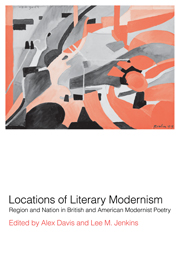Book contents
- Frontmatter
- Contents
- Notes on contributors
- Preface
- INTRODUCTION
- PART ONE OBSTINATE ISLES: THE ANGLO-CELTIC ARCHIPELAGO
- 1 MacDiarmid in Montrose
- 2 Bunting and Welsh
- 3 Antithesis of place in the poetry and life of David Jones
- 4 ‘Shut, too, in a tower of words’: Dylan Thomas' modernism
- 5 ‘Literally, for this’: metonymies of national identity in Edward Thomas, Yeats and Auden
- 6 Reactions from their burg: Irish modernist poets of the 1930s
- PART TWO AN AMERICAN PLACE
- Notes
- Index
5 - ‘Literally, for this’: metonymies of national identity in Edward Thomas, Yeats and Auden
Published online by Cambridge University Press: 06 July 2010
- Frontmatter
- Contents
- Notes on contributors
- Preface
- INTRODUCTION
- PART ONE OBSTINATE ISLES: THE ANGLO-CELTIC ARCHIPELAGO
- 1 MacDiarmid in Montrose
- 2 Bunting and Welsh
- 3 Antithesis of place in the poetry and life of David Jones
- 4 ‘Shut, too, in a tower of words’: Dylan Thomas' modernism
- 5 ‘Literally, for this’: metonymies of national identity in Edward Thomas, Yeats and Auden
- 6 Reactions from their burg: Irish modernist poets of the 1930s
- PART TWO AN AMERICAN PLACE
- Notes
- Index
Summary
Poetry, Mr Baldwin has assured us, is essentially a harmless vocation, so long, that is, as the poet shuts out from his vision all that part of life which might affect the ‘harmless’ character of his work. This narrow view of the artist's function is a very modern one.
Ralph Fox, The Novel and the People (1937)Every one of our little fights or attacks was significant, they made panoramic pictures of the struggle in the people's eyes and lived on in their minds. Only in our country could the details of an individual fight expand to the generalisations of a pitched battle … [T]he people saw the clash between two mentalities… and two philosophies of life; between exploiters and exploited. Even the living were quickly becoming folklore.
Ernie O'Malley, On Another Man's Wound (1936)Eleanor Farjeon records an exchange in 1915 with Edward Thomas, who had just enlisted in the Artists' Rifles:
It might have been next year when we were walking in the country mat I asked him the questions his friends had asked him when he joined up, but I put it differently. ‘Do you know what you are fighting for?’ He stopped, and picked up a pinch of earth. ‘Literally, for this’. He crumpled it between finger and thumb, and let it fall.
- Type
- Chapter
- Information
- Locations of Literary ModernismRegion and Nation in British and American Modernist Poetry, pp. 113 - 134Publisher: Cambridge University PressPrint publication year: 2000
- 2
- Cited by



